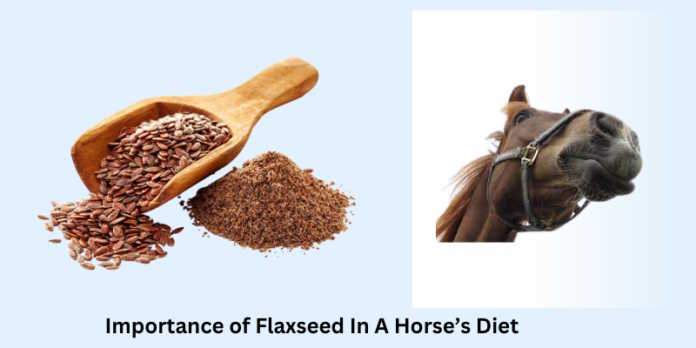These tiny brown seeds grown in cooler climes can help your horse’s health in many ways. Flaxseeds are increasingly becoming popular as the most nutritional feed for horses. Packed with Omega fatty acids, phytonutrients and many health benefits, these tiny seeds have an important place in a horse’s diet.
The article will explain how flaxseeds are essential and how you should incorporate them into your equine’s diet.
Flaxseed is high in Essential Fatty Acids (EFAs)
Omega fatty acids, also known as Essential Fatty Acids, are what make flaxseed a popular horse feed. Flax contains a high-fat profile, most of which is in the form of two polyunsaturated fatty acids, like Linoleic acid and Alpha-Linolenic Acid (ALA).
Whether human or horse, everyone needs these fats to be healthy, but our bodies can’t produce them. Therefore, we have to rely on a diet that completes the requirements of these EFAs. Flax seeds are considered a rich source of both types of polyunsaturated fats.
LA is an Omega-6 category of fatty acid and shares 16% of flaxseed’s total fat content. This fat is converted to arachidonic acid, which helps form inflammatory prostaglandins and eicosanoids.
ALA is one of many types of Omega-3 fatty acids and comprises 58% of flaxseed’s fat content. Unlike LA, it has the opposite effect on inflammation. It reduces inflammation as it goes through a different metabolic pathway, forming anti-inflammatory omega-3 fatty acids known as docosahexaenoic acid (DHA).
Feeding flax seeds helps correct the imbalance of omega-3 and omega-6 in your horse’s diet. This helps avoid all sorts of inflammatory issues and supports the immune, circulatory, and digestive systems.
Besides this, their coats will become soft and shiny, their skin will become healthy, their joints and muscles will be stronger and repair quickly, and their hooves will be robust and less prone to cracking.
How to feed flaxseed to my horse
One of the best ways to feed flaxseed to your horse is in ground form. Brokedown seeds easily digest and release nutrients. Whole grains are tiny and often go unchewed. Their strong outer hull is hard to break down by digestive juices. So, seeds often pass through the digestive tract and come out whole in manure.
Sometimes, hindgut bacteria digest the outer hull fibres and generate energy. But that would not be as significant as the omega-3 content in the inner part of the seeds. So, it is better to feed your equine ground flaxseed.
However, make sure you grind the powder in small amounts and only when needed. The omega-3 fatty acids are highly vulnerable and quickly evaporate once exposed to air, heat, or moisture.
How much should I feed?
The amount of flaxseed you feed your horse depends on various factors, including age and weight. Generally, approximately 500 kg of an adult horse with healthy weight should be fed half one cup of ground flax seeds.
This amount would be the same for growing and yearling horses. However, foals should be fed less: about ¼ cup a day. If you are unsure how much your equine needs, ask your veterinarian, who will help you with feeding advice.
If your horse has health issues that will benefit from flaxseed powder, you may want to feed larger amounts, a maximum of up to 4 cups a day. But make sure you don’t overfeed them.
And reduce this amount to ½ to 1 cup daily when you notice improvements. Don’t feed more than two cups for a prolonged period, as it may cause weight gain.
Moreover, when you start feeding your horse with flax, ensure you start with a small amount and increase it gradually over 2-3 weeks. This will allow their digestive system to adapt to the increased fat content in the feed.
A Few words on Flaxseed and cyanide poisoning
Flaxseed is said to cause cyanide poisoning, as they contain cyanogenic glycosides, like many other plants, as its defence mechanism. However, cyanide poisoning from flaxseed is extremely unlikely.
The number of cyanogenic glycosides found in flaxseeds can cause low-level exposure. It would take a high amount of flaxseed to cause any poisoning. The substance is high in green, raw flaxseed. The mature, brown seeds only contain a fraction of that. So, there is nothing to worry about.
Moreover, soaking flax seeds in water can increase the cyanide level. Also, boiling the seeds makes hydrogen cyanide evaporate. However, this is optional, as ground or whole flaxseeds can be safely fed as they are.
Conclusion
Flaxseeds are a great source of EFAs that can positively affect your horse’s health. The high content of Omega fats and phytonutrients offers a lustrous coat, healthy skin, stronger joints, increased muscle mass, and strong hoofs.
If you want to leverage all these benefits of flaxseeds, consider stocking them up in bulk to have an ample amount to meet daily demand. Flaxseeds are readily available at many online wholesale spice suppliers or physical, brick-and-mortar wholesalers.












